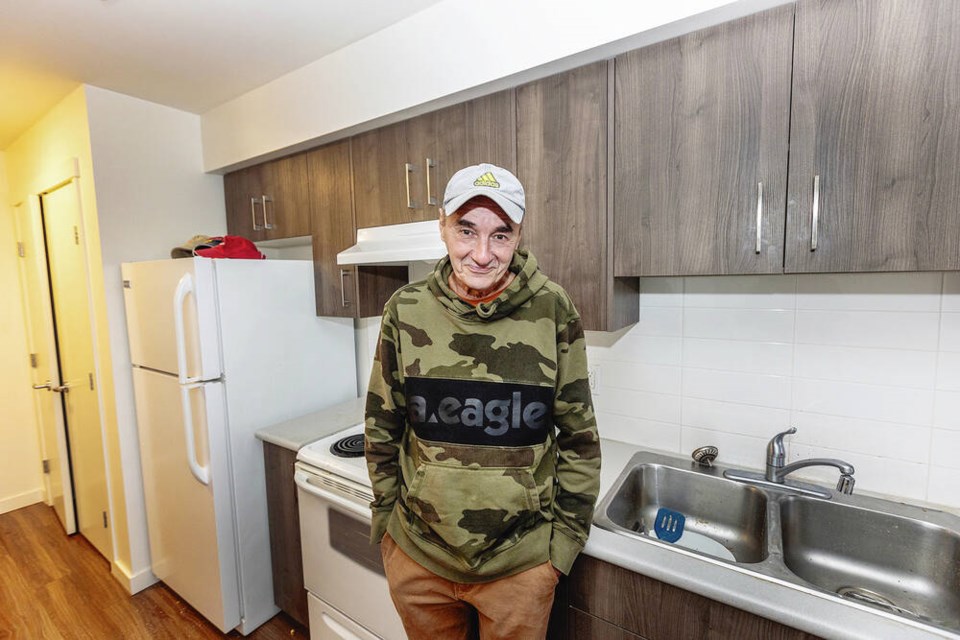After Stephen Wesley moved from a tent in Topaz Park to his own studio apartment in October, he cried for three days.
“I was just so happy when I got this place,” he said.
And then he fell sick for a few days. Wesley thinks his body was finally able to relax after living in the park for four months, leading to tears of relief and the flu.
“You have to be alert all the time,” Wesley said. “People coming up to your tent with flashlights high, looking to steal stuff. People asking for lighters in the middle of the night. The police coming and knocking on your tent looking for people that are wanted. It was constant.”
Wesley said he was comfortable enough sleeping in Topaz.
He dutifully packed up his tent each morning before 7 a.m., per Victoria bylaws, and carted his belongings around with him during the day. But moving indoors has given him a sense of peace, and now that he’s an “insider,” as his unhoused friends call him, he never wants to go back.
“Do I miss it? No.”
Wesley is one of the first people who was helped into housing by a team at Pacifica Housing that was hired by the city to work one-on-one with people sheltering in four parks: Topaz Park, Stadacona Park, Regatta Point Landing and Hollywood Park.
Victoria council wanted to prohibit overnight camping in the parks, and decided to make the ban contingent on finding appropriate housing for those sheltering there, allocating $25,000 to hire a third-party relocation co-ordinator from July to December.
Coun. Krista Loughton had seen how working with people on an individual basis could quickly lead to people in parks moving indoors and staying housed.
This year, with the help of an outreach worker, Loughton approached someone she knew who was sheltering in a park.
“We asked them a simple question: What do you need right now?”
A market rental with a roommate was the answer.
Within a few days, the outreach worker had found a potential apartment and roommate for the individual, Loughton said. Another group helped connect the person with a rent supplement.
“It would have been very hard for this individual to go and do that work themselves because they can’t leave their things,” she said.
People sheltering in parks risk losing their belongings if they leave them, and they usually don’t have access to a computer to fill out applications, so they’re left trying to complete documents on a phone that can be challenging to keep charged, Loughton said.
Since mid-August, a two-person team at Pacifica Housing has helped 11 people to move indoors. Five people are living independently, four are in supportive housing and two are in shelters.
Sandie Mashon is one of two people on the team at Pacifica who visits the parks daily to build relationships with the people there, figure out their housing needs and find the right fit for them.
She starts by completing a vulnerability assessment, which takes about an hour per person, to determine the best housing fit. She asks questions about a person’s housing history, medical needs, mental health and substance-use challenges to get a detailed picture.
The goal is to determine the housing situation that best fits an individual so they’ll remain housed, said Carolina Ibarra, chief executive officer of Pacifica Housing.
Individuals who have moved into housing without this personalized approach don’t always stay there, because it didn’t meet their specific needs, and they end up leaving or being evicted, she said. “If it’s going to be successful, it can’t be rushed.”
For those who are able and want to live independently, like Wesley, Mashon consults with Pacifica’s landlord liaison, who has a pulse on available rentals at the low end of market rents.
In buildings that contain a mix of units at market rents and below-average market rents, units can rent for as little as $1,100 a month. With the help of rent subsidies, the cost to an individual can be even lower.
Before helping someone move into a market rental, the liaison visits the prospective tenant with Mashon to thoroughly vet the person and ensure they’ll fit into the housing situation.
Pacifica helps connect people with rent subsidies and provides furniture, kitchen supplies and grocery gift cards when possible.
Still, money is tight for Wesley, who, at 67, is living on limited income from Old Age Security and his Canada Pension Plan. He makes things work by visiting food banks and living minimally.
The original four parks are now empty, and the team has turned to other parks and hopes to continue the work in the new year.
The city’s draft budget proposes continuing the program. It will be funded until at least March, when council is expected to make decisions on the budget.
After settling into his new home, Wesley went to Victoria West Park with a warm wool blanket and a ground sheet. He found two young guys in a tent and gave them the supplies.
They were grateful and a little confused, wondering if he wanted something in exchange for the items.
“No. You know what my answer was to them? I was you for six months.”



